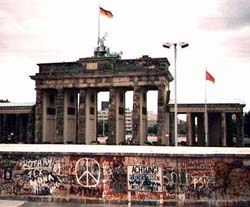Feb 05 2014
The Principal Argument
In my reading of The Walls Came Tumbling Down by Gale Stokes, his thesis was valid – that an abandonment of the prospect of reform had vital, and causative, importance in the eventual collapse of communist regimes in 1989. That fundamental point is accurate, in that the abandonment of reform as an approach to improve communism was essential to convince people that the possibilities for their lives would not expand past a certain point. The truth that had to be accepted was that the neither the Marxist-Leninist ideal nor the Neo-Stalinist reality, within which many citizens of the nations of the Warsaw pact lived, would ever cede its totalitarian power as promised in the utopian vision of a new socialist world where eventually the state would wither. The predictable failure of the project to change human nature and create a new socialist man and communist society was a difficult one for some to accept, but once they did, change was inevitable.
That said, I do not think Dr. Stokes gave enough attention or credit to the decisive role of the conscious, even if uneven, choices to avoid violent coercion which made 1989 possible. His heavy focus on Solidarity in Poland does convey that the Polish regime believed it could prevent an intervention of the kind experienced in 1968 Czechoslovakia, by limiting the dissent; also the early characterization of Lech Walesa ascribes to him to a similar sentiment, that self-limitation would provide safety. Once the situation in Moscow changes in the mid-80s, that calculation must also have changed, and once it became apparent that the shift away from the Brezhnev Doctrine was genuine, the tactics of dissenters and reformers seems to have accordingly become more assertive . The evidence that Stokes presents of crowds crying out “Gorby” during his visits testify to the symbolic importance of his leadership, and I am unconvinced that continual repression, the weak recovery from recession, or the lure of the new Europe would have been enough to ensure that the liberation of 1989 occurred despite violent crackdowns that could well have happened without the restraint/exhaustion of communist leadership. Whether it was truly restraint or just fatigue at having to enforce the order of a morally bankrupt system, authorities made conscious efforts to alter their pattern, and consequently their power to rule was taken by the ascendant forces of change (and even in Romania, the army that fought the state security forces changed their behavior in some significant way).
In his treatment of Yugoslavia, I think Stokes rightly sets it apart as a unique case, and gives separate treatment of the ethnic tensions that broke down, and later exploded the Yugoslav state. Somewhat apart from his arguments about the causes of collapse in the other states, he seems to argue that it was the long term instability of a state premised on South-Slavic unity that ensured the break-up of Yugoslavia, and the paranoid and superficial efforts to maintain that unity over decades that caused it to be so bloody.
The map of Bosnia (http://www.loc.gov/resource/g6861e.ct003048/) provided serves to clarify the distinctions between ethnic affiliation, and indicate how they relate to nationalist politics. In the political settlement intended to end the conflict in Bosnia at the Dayton Accords a line was finally drawn, which has endured, ostensibly dividing Serbs on one side from Croats and Bosnian Muslims (Bosniaks) on the other. The differences in ethnic composition from 1991 and ethnic control in 1997 reflect not only the violent ethnic cleansing of the wars, but also that ethnic division in Bosnia is not neat or simple and peace required, and still requires, compromise. And even though the ethnic distinctions (which seem to be mainly along religious lines as opposed to linguistic) between Serbs, Bosnian Muslims, and Croats may confound citizens of an multi-ethnic nation with religious tolerance enshrined in law, they were and are all too real; furthermore opportunistic nationalist politics can use various justifications beyond nationality as typically understood (ethnicity, class, religion, etc.) to suit its ends, and this is reflected in some of the other cases in the text north and east of Yugoslavia as well.
The conclusions from Stokes were interesting in comparing the first and second editions. In the first he seemed to emphasize the triumph of pluralism over the hyper-rationalist approach to modern development. As he recounted the early struggles of these new regimes, it was apparent that he was confident in the momentum of the formerly communist states toward becoming thoroughly European. In the second edition, he seems more circumspect than when he wrote in the 1990s of “invisible structural strength” that follows when totalitarian dysfunction disappears. His sources seem to rely heavily on recent and contemporary scholarship and journalism from the 1980s and 1990s (and in the second edition from the 2000s), with some limited personal accounts; that balance seems appropriate given the scale of his project, and the cultural and political forces that are emphasized. The second edition seems to better distinguish between the victory over communism and the inevitable challenges, and possible regression, that lay ahead for the cases he examines. Considering the updates in information, he does a good job of acknowledging the relative failures of neoliberal efforts at shock therapy in the Czech Republic, where in the first edition he had been cautiously optimistic about its early successes. In all of the cases he reflects upon the enduring challenges of uneven economic progress and the travails of European integration, and in both editions his identification of pluralism more as a process than an outcome justifies optimism.
Comments Off on The Principal Argument
